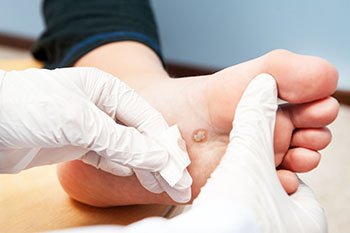 Common warts that form on the bottom of the foot are known as plantar warts. Plantar warts form as a result of the human papilloma virus, (also known as HPV) which tends to thrive in warm and moist environments like locker rooms, shower floors, and swimming pools. Common signs that the skin growth on the foot is a plantar wart include the growth being raised, feeling hard, having a rough surface, or possibly having small black dots near the center. Plantar warts may also be painful when standing or applying pressure to the wart. While many warts eventually go away on their own, plantar warts that persist should be looked at by a podiatrist. Patients with diabetes, circulatory problems, or vascular disease should also have their plantar wart checked by a podiatrist.
Common warts that form on the bottom of the foot are known as plantar warts. Plantar warts form as a result of the human papilloma virus, (also known as HPV) which tends to thrive in warm and moist environments like locker rooms, shower floors, and swimming pools. Common signs that the skin growth on the foot is a plantar wart include the growth being raised, feeling hard, having a rough surface, or possibly having small black dots near the center. Plantar warts may also be painful when standing or applying pressure to the wart. While many warts eventually go away on their own, plantar warts that persist should be looked at by a podiatrist. Patients with diabetes, circulatory problems, or vascular disease should also have their plantar wart checked by a podiatrist.
Plantar warts can be very uncomfortable. If you need your feet checked, contact Matthew McQuaid, DPM from Lake Mendocino Podiatry. Our doctor will assist you with all of your foot and ankle needs.
About Plantar Warts
Plantar warts are the result of HPV, or human papillomavirus, getting into open wounds on the feet. They are mostly found on the heels or balls of the feet.
While plantar warts are generally harmless, those experiencing excessive pain or those suffering from diabetes or a compromised immune system require immediate medical care. Plantar warts are easily diagnosed, usually through scraping off a bit of rough skin or by getting a biopsy.
Symptoms
- Lesions on the bottom of your feet, usually rough and grainy
- Hard or thick callused spots
- Wart seeds, which are small clotted blood vessels that look like little black spots
- Pain, discomfort, or tenderness of your feet when walking or standing
Treatment
- Freezing
- Electric tool removal
- Laser Treatment
- Topical Creams (prescription only)
- Over-the-counter medications
To help prevent developing plantar warts, avoid walking barefoot over abrasive surfaces that can cause cuts or wounds for HPV to get into. Avoiding direct contact with other warts, as well as not picking or rubbing existing warts, can help prevent the further spread of plantar warts. However, if you think you have developed plantar warts, speak to your podiatrist. He or she can diagnose the warts on your feet and recommend the appropriate treatment options.
If you have any questions please feel free to contact our offices located in Lakeport and Ukiah, CA . We offer the newest diagnostic and treatment technologies for all your foot and ankle needs.
Read more about What Are Plantar Warts?